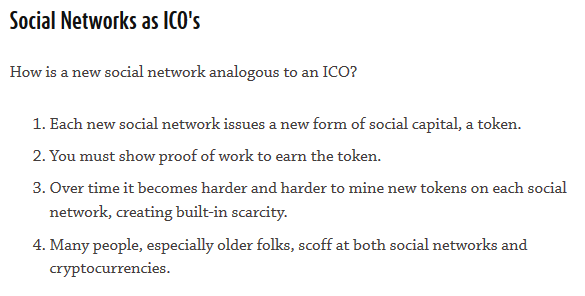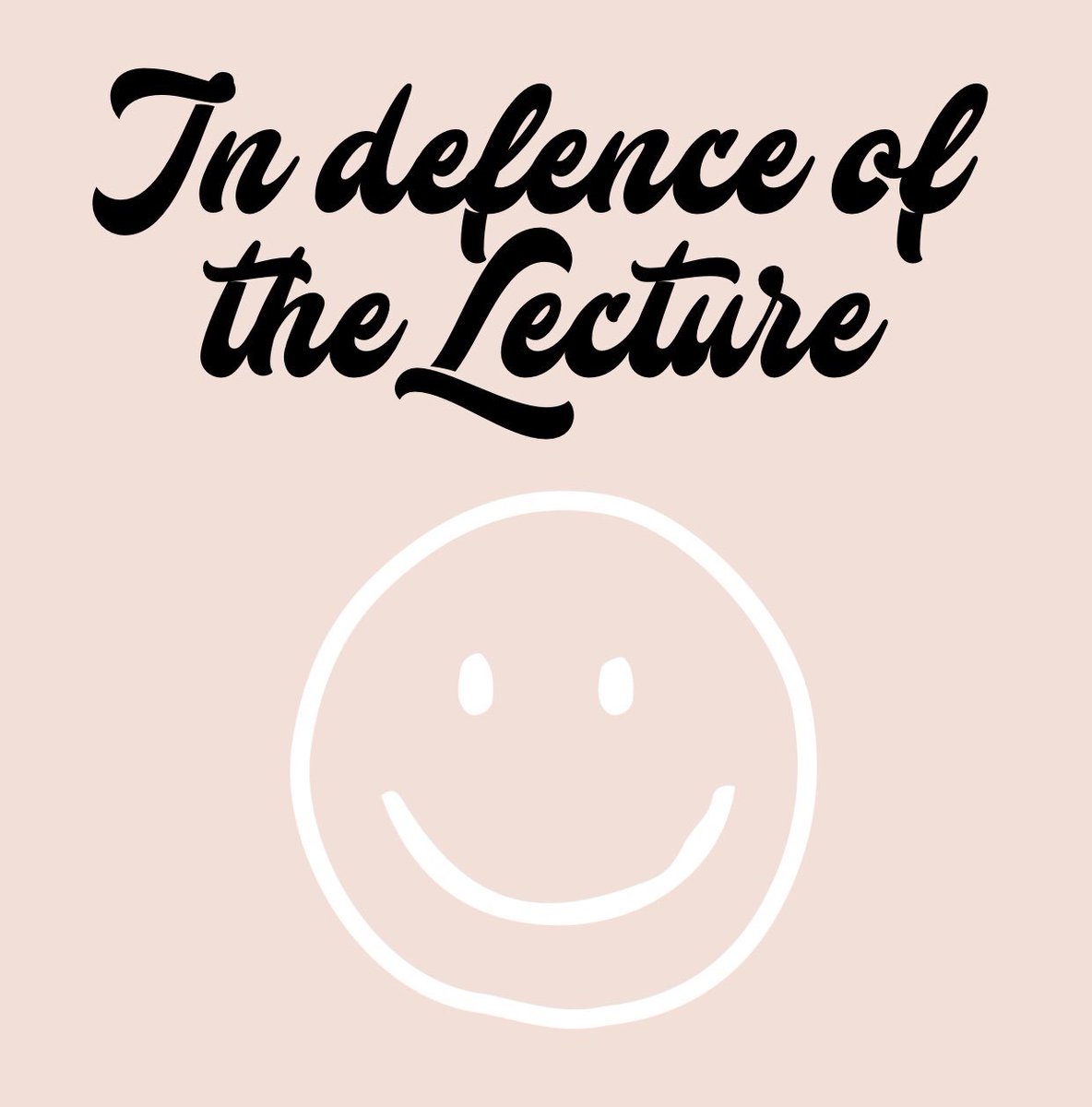Hopefully this will be good motivation for me to sit with it and really read.
1) People are status-seeking monkeys.
2) People seek out the most efficient path to maximizing social capital.
Wei begins with these because few would dispute them but they're also rarely used to analyze social networks.
But "social capital is, in many ways, a leading indicator of financial capital, and so its nature bears greater scrutiny."
1) Such networks must overcome the "cold start" problem & attract users when they have few users.
2) Such networks must generate network effects & achieve flywheel growth.
"Come for the tool, stay for the network." -@cdixon
But why do SNs fail? Questions of this ilk can be answered by social capital theory.
SN analysis should study their accumulation of social capital assets & the nature & structure of its status games.
FB: posting some witty text-based status update.
Insta: posting an interesting square photo.
Vine: posting an entertaining 6-sec video.
Twitter: writing an amusing bit of text in ≤ 140 chars.
This transfers readily across most arenas in which status games are played.
This is less true for specialized fame; few people follow renowned economists on Insta.
But, unless you're famous as described above, competition for that SC is more intense than in earlier stages of that SN's status game.
This is because everyone knows how the game works.
If it were easy to gain, it wouldn't be worth anything. Value derives from scarcity which, on SNs, derives from work.
"Status is a relative ladder... If everyone can achieve it, it’s no status at all, it’s a participation trophy."
After Favstar & Favrd (both now defunct) began ranking tweets on a global leaderboard, Twitter turned into a competition to compose popular tweets by being funny & clever.
Today, everyone on Twitter is thirsty for attention.
It is the lifeblood of a Status as a Service business.
To succeed at carving out unique space in the market, social networks offer their own unique form of status token, earned through some distinctive proof of work."
But their filters could make any pic look gorgeous, so the relative photography skill of users didn't matter.
It didn't make sense to follow one person over another bc the star was the filter, not the person.
"A new Status as a Service biz must devise some proof of work (PoW) that depends on some actual skill to differentiate among users.
If it does, then it creates, like an ICO, some new form of SC currency of value to those users."
We said "people seek out the most efficient path to maximize their social capital."
This implies they have a sense for how different strategies vary in effectiveness. Young people especially.
"The gradient of your network's SC ROI can often govern your market share among different demographics.
Young girls flocked to Musically bc they were uniquely good at lipsync dance routine vids that it rewarded."
Some SNs reward those who gain a lot of followers early on with so much added exposure that they continue to gain more followers than other users, regardless of whether they've earned it."
SNs should distribute the best content, w/e the definition of quality, regardless of the vintage of user producing it."
Duplicating the basic PoW of an incumbent Status as a Service duplicates the existing status game. Hence, there's no new status ladder and no incentive to move to a new SN with no one on it.
But normally, these are pure utility plays (e.g. different local messaging apps around the world).
First mover advantage enables the market leader with a dominant graph and high value SC to "reverse copy", grafting the new competitor's features into their own.
Before that, users had to actively click through to other users' profiles to find activity on the network.
It "increased the efficiency of distribution & pitted all posts against each other in 1 giant attention arena, complete w/ live scoreboards on each post."
A brief aside here on why this tends to hold.
Young people are generally SC poor unless they've lucked into a fat inheritance. The fastest path to gaining SC is to ply their trade on social media.
It's inefficient for young people to play the adults' game.
Both sides pursue optimal strategies for them.
They need to keep these separate or risk context collapse (e.g. sending something meant for friends to boss or teacher).
Hence, expiration of content is key (Insta, Snap). FB is a bad fit.
No one does this better than WeChat.
Wei can't think of anyone in China who's gone cold turkey on WeChat; that's how embedded it is as a daily utility.
The chosen PoW mechanism is itself an asymptote on growth.
The # of people who wish to engage in a given PoW (crafting 280-char info nuggets, lipsyncing to songs, etc) is finite.
Active users is a ceiling on growth.
"To understand the inherent fragility in Status as a Service businesses, we need to understand the volatility of status."
But this, of course, diminishes the distribution of any 1 post from any 1 user.
One day, FB decided to limit the reach of Pages; this was controversial, but necessary to prevent a tragedy of the commons re: users' attention.
NEs can unwind just as fast as they're generated. If the network cracks, the business unravels.
"Status relies on coordinated consensus to define the scarcity that determines its value. Consensus can shift in an instant."
As Groucho Marx said: "I don't care to belong to any club that will have me as a member."
A status hierarchy needs underlings so that high-status people have a sense of how high up they are.
A leaderboard with a single high score is pointless.
But there's a tipping point past which SNs lose their "cool" factor.
This is the "evaporative cooling" of SNs.
The only way to prevent a nosebleed of churn is to ensure the product delivers as much utility as possible.
Magazine editors & fashion designers declare arbitrary new styles seasonally (with 0 utility change), retiring old stuff before it grows stale.
"The industry is pulling the frontier of scarcity forward like a wave we're all trying to surf."
"This is because the stability of a status lattice depends just as much on the composition of the network as its total size."
The canonical example is youth migrating off FB when parents got on.
Beyond Snapchat's UI being a "tamper-proof lid" for parents, it puts the camera first, where older folks are text-first. This adds work for old people.
CEO Evan Spiegel said in a strategy memo that Snap needs to refocus on being the fastest way to communicate.
This will move them more towards utility, stabler ground on which to build a biz.
But the idea that kids use Snap as a pure messaging utility is laughable.
If the PoW burden doesn't change, the store of social currency will eventually be depleted.
Then, the status-driven potential energy of the SN flattens. The SN can go stale if it doesn't have sufficient utility.
Consider how Insta began with square photos + filters.
It's since removed the aspect ration constraint, added video, and new formats like Boomerang and Stories.
It’s a variant of winner's curse. The easiest way to empathize with users is to be the canonical user yourself.
But...
"Til we have metrics that distinguish healthy & unhealthy activity, SN execs largely have to steer by anecdote."
When it comes to SNs, the thickest veil of ignorance is the metrics dashboard that munges 100s, 1000s, or even millions of cohorts into just a handful."
They are hardly in need of more status, except of a type they won't find on their own networks."
"That some of the largest, most valuable companies in history have been built so quickly in part on creating status games should be enough to convince you of the existence and value of social capital."
Perhaps the most oft-cited example of a social-to-financial-capital exchange is the type pulled off by influencers on Instagram and YouTube."
"Agencies have sprung up in China to develop & manage influencers, almost like farm systems in baseball. The speed at which SC can be converted into your own branded product lines is accelerating by leaps and bounds, and nowhere more so than in China."
"For the individual user, we've standardized on a few basic social capital accumulation mechanisms. There is the profile, to which your metrics attach, most notably your follower count and list."
Likes correlate with your activity volume & serve as a source of short-term SC injections, even if each like is less valuable than a follower or a friend."
Users couldn't claim any of the SC created there.
The toxicity of things posted to those networks would actually provide negative SC if claimed.
People sometimes will wholesale abandon social networks, but it's rare unless the status earned there has undergone severe deflation."
"Because social networks often attract different audiences, and because the configuration of graphs even when there are overlapping users often differ, opportunities exist to arbitrage social capital across apps."
In our world of infinite content, offering rewards for surfacing interesting things is incredibly reliable as an incentive.
Reddit is the archetypal example of this with their karma currency.
Yelp threw parties to reward Yelp Elite for reviewing things.
Amazon's Top Reviewer List and Global Sales Rank turned reviewing products and driving sales into competitions.
Status permeates everything.
"From a user perspective, people are starting to talk more and more about the soul-withering effects of playing an always-on status game through the social apps on their always connected phones."
But it's not all bad: things are "built by people who feel, in part, a jolt of dopamine from the recognition that comes from contributing to the world at large."
Something like Wikipedia, built in large part on egoboo, is a damned miracle.
I don’t want to lose that. I don’t think we have to lose that."
There's unbounded downside risk to just wiring together billions of people with few guardrails."
Fin.
Credit for good stuff belongs 100% to @eugenewei
Hope I played the status game right 😈











